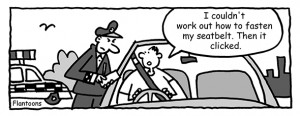Laughing and Learning : An intro to Puns
Should I write to, two, or too? Well, that depends on whether the word you want is a preposition, a number, or a synonym of also.
How do I pronounce the word tear? It rhymes with ear if you are talking about crying and air if you are talking about ripping.
What did he mean when he said fine? Depending on the context, he could mean that everything is good or that someone had to pay some money.
Did someone just say tense or tents? It’s tense if they want to say they aren’t relaxed and tents if they just got back from a camping trip.
As you can see, English isn’t always easy to learn. It contains many homophones (words that are pronounced the same but spelled differently and have different meanings), homographs (words that are spelled the same but have a different pronunciation and meaning), and homonyms (words that are spelled and pronounced the same but have different meanings). While this makes learning more difficult, it also gives us the opportunity to have some fun with the language.
How does it do that? With puns! Put simply, a pun is a joke that plays with words and their meanings to be funny. And English is full of them. There are other types of puns, but the simplest ones involve homophones, homographs, and homonyms. So let’s focus on these first.
Here’s a quick example:
Why did the spider go to the computer?
To check his website.
Since you are reading this online, I think you know what a website is. However, web and site have their own definitions. A web is something that a spider makes to catch insects. And site is another word for location. So is the spider checking his homepage or the location of his web? The double meaning and confusion is what makes it funny.
HOMONYM PUNS
Let’s take a closer look at some homonyms and then go over some puns that use them. These words have the same spelling and pronunciation, but multiple meanings:
saw – the past tense of see
saw – a tool used for cutting
The blind man picked up a hammer and saw.
Did he begin to see after picking up the magical hammer? Or did he pick up two tools?
sentence – in grammar, a set of words that express a complete idea
sentence – the punishment given to a criminal for breaking the law
A prisoner’s favorite punctuation mark is the period. It marks the end of his sentence.
Does the period mean that he will be released from prison, or does he just like periods in grammar?
interest – caring about something
interest – the extra money you have to pay back when you borrow money
I used to be a banker, but I lost interest.
Was he a bad banker and lost money for the bank? Or does he just not find the job interesting anymore?
HOMOPHONE PUNS
And here are a few homophones. The two words are pronounced the same and can be used in the following puns:
profit – the money that a person or company earns
prophet – a person who delivers messages from God
Atheism is a non-prophet organization.
Atheists don’t believe in God, so they also don’t believe in prophets. But atheism also doesn’t earn any money, so there aren’t any profits.
whine – to cry
wine – an alcoholic beverage made from grapes
What did the grape say when it got stepped on? Nothing, but it let out a little whine.
Was the grape crying? Or did crushing it produce a delicious beverage for us to enjoy?
steak – a piece of meat
stake – a wooden post with a point on one end
You kill vegetarian vampires with a steak to the heart.
Vegetarians don’t like to eat meat, and one way to kill a vampire is to nail a wooden stake into his heart.
ADDITIONAL LEARNING OPPORTUNITIES
So now that you know a little bit about puns, how can you use them to improve your English? Here are a few ways:
Read some more puns (along with explanations) here:
http://www.englishwithnick.de/en/humor/basic-puns-with-explanations/
Or, you can increase your vocabulary by reading through these lists of homophones and homographs. To test your new knowledge, write a single sentence that includes both meanings of the. For example:
Fall (to drop to the ground) / Fall (Autumn) – The leaves will fall off the trees in the fall.
Homophone List – https://www.englishclub.com/pronunciation/homophones-list.htm
Homograph List –
http://examples.yourdictionary.com/examples-of-homographs.html
Once you’ve got a bit more experience reading and understanding puns, try to write your own! Take a word with multiple meanings and see if you can construct a situation where both meanings make sense. Normally we try to make our sentences as clear as possible, but when writing jokes, the humor comes from the ambiguity.

